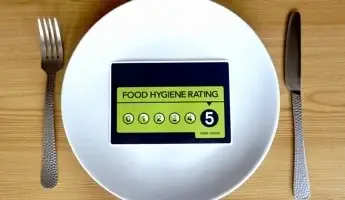How to meet UK food safety regulations
- Fridgesmart

When running a small food production business such as a café, takeaway, catering company or local restaurant, meeting UK food safety regulations is vital. While there are many laws you need to comply with, most are governed by common sense.
The Food Standards Agency (FSA) regulates how food is prepared, stored and served in the UK. You’ll find everything you need to know on their website.
Here at Fridgesmart, we provide commercial fridges and freezers. This page explains a few fundamental points regarding food storage and prep and why getting the right unit is essential.
General standards overview
In general, food must be prepared, stored and served in a safe manner that meets customer quality expectations. It must also be labelled without any misinformation (including missing ingredients and nutritional information).
That’s a brief overview. However, there are many more things you need to know about the specifics of storing food and drink. You’ll find a complete list on the FSA website, as mentioned.
The FSA can always be contacted directly, too.
When do you need to use a commercial fridge?
Commercial fridges are essential for maintaining the freshness of your ingredients. They slow the growth of most bacteria and must be used while following FSA standards. Once you’ve invested in the right commercial fridges for your business, here are some of the things you need to bear in mind…
1) Use-by date labels
Whenever something goes into your fridge, it must have a use-by date. This could be on the packaging from when you bought it, or, in the case of leftovers or unused ingredients, you must use a labelling tool to mark it.
The date you should put on depends on the food you’re working with. Research this information and draw up a document, so you and your employees don’t forget.
2) Don’t place hot food into the fridge
Bacteria loves warm surfaces, so putting hot or warm food into the fridge straight after cooking can introduce bacteria into an otherwise clean environment. After you cook food, cover it loosely with foil or cooking paper to breathe, and let it cool reasonably quickly by leaving it on the countertop or work surface in its container. After one or two hours, it should be at room temperature. At this point, it’s safer to put it in the fridge.
3) Follow storage requirements for individual foods
Each food type is different. You’ll store fresh veg very differently from meat.
In the same vein, it’s vital to follow FSA advice when it comes to ordering your fridge. For instance, raw meats can’t be stored on top of anything else. Sometimes, they must be kept in a separate fridge (for example, a fish fridge).
4) When preparing chilled food, take it out as late as possible
The longer food stays in the fridge (before its use-by date), the better. If you’re taking something out of the fridge – for example, lettuce or a pre-cooked meal – remove it only when necessary. This minimises bacterial growth.
In the case of fresh produce that can return to the fridge (like lettuce), put it back in as soon as possible.
5) Don’t overfill a commercial fridge
When a fridge is too full, air can’t circulate. This makes it much harder for the unit’s fan to maintain an ambient temperature and humidity. You’ll end up with poorer refrigeration as a result.
You can usually remove non-essential items from a fridge.
Getting the right-sized fridge unit is essential when you’re buying one. Don’t forget to plan ahead if your business is likely to expand.
6) Use a separate fridge thermometer
You should use a separate fridge thermometer alongside the one installed in the unit. It should be around 2°C, which is suitable for keeping most chilled ingredients safe, although always check the label, as different foods require different temperatures. This protects the food or drink (and you) if the in-built one malfunctions.
When do you need to use a freezer?
As a business, you use a commercial freezer to extend how long you keep food. You must use a commercial freezer to ensure it’s up to FSA standards and reaches low enough temperatures.
You can freeze food up to midnight on the use-by date. Of course, some foods (such as ice cream) must stay frozen regardless. Again, here are a few tips on using your freezer safely.
1) Cool warm food before putting it in the freezer
You shouldn’t put warm food straight into the freezer. It’ll lose some of its nutritional, taste and texture properties due to the sudden temperature change.
More dangerously, the hot container will warm the inside of the freezer (even though it’ll be temporary). This warming process could cause other produce to start defrosting, allowing more bacterial growth than necessary.
2) Freeze food in an airtight container or wrap
There are three reasons for freezing food in an airtight container:
- It won’t be affected by freezer burn
- It won’t dry out from the air circulating through
- It won’t contaminate anything else before freezing.
3) Don’t refreeze defrosted food (unless re-cooked)
When you deep freeze food, you press ‘pause’ on bacterial growth. Sub-zero temperatures don’t kill bacteria; they make them dormant.
As soon as you start defrosting, those bacteria start multiplying again. Once you’re at room temperature, they’ll be spreading rapidly.
That’s why it’s dangerous to refreeze food at this point. However, if you cook it, this process will kill them off again. Defrosted produce should be consumed within 24 hours of coming out of the freezer.
4) Know the ‘Danger Zone’ temperature range
The ‘Danger Zone’ (as referred to by the FSA) temperature range is between 8°C and 63°C. When food is within this range, bacteria can multiply rapidly, making you ill if you ingest them. That’s why you should always allow food to cool to room temperature before chilling or freezing it.
How Fridgesmart can help
Fridgesmart stocks a vast range of tried and tested commercial fridges, freezers and accessories. Whether you run a café, takeaway, sandwich shop, ice cream parlour, restaurant or fast-food store, reliable commercial fridges and freezers form the backbone.
For more information on the products we offer and what we can do to help, why not get in touch? Drop us a message on our live chat, and we’ll get back to you as soon as possible.


